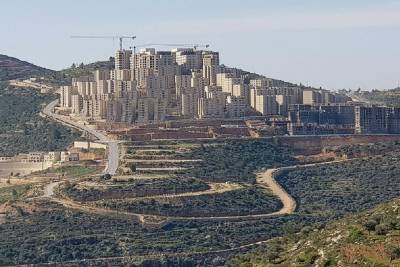Palestine's economy is like a coiled spring, says British financier
The Independent - Donald Macintyre - Investment conference backed by Tony Blair told that political progress could spark rapid growth
Foreign financiers were urged yesterday at a conference promoted by Tony Blair to risk investment in the stricken Palestinian economy – in part because of its capacity for unusually rapid growth in better political conditions.
The British venture capitalist Sir Ronald Cohen told a Palestinian Investment Conference session here chaired by the Palestinian Prime Minister, Salam Fayyad, and Mr Blair, the international community's Middle East envoy: "The Palestinian economy is like a coiled spring that has been pushed down, down, down and is ready to bounce back."
Sir Ronald, chairman of the Portland Trust, which promotes private sector projects in the occupied Palestinian territories, said that with per capita GDP having decreased by 40 per cent since the beginning of the intifada in 2000 it was a "spring that was capable of surprising the world economy" and reaching three times its present size.
His message to investors, including ones from the Gulf states, was reinforced by Juan Jose Daboub, managing director of the World Bank, which has laid much of the blame for Palestinian economic decline on Israeli restrictions on movement and access to markets.
Mr Daboub said that Palestinians were still well placed to attract investment, ranking 22nd in the world for business-friendly tax policies and 33rd in having a legal framework to protect investors. "While there are risks, there can also be significant returns for businesses willing to get into the elevator on the ground floor," he added.
In a development urged publicly by the World Bank and behind the scenes by Mr Blair, the Qatari-backed Wataniya Mobile said last night it had received Israeli assurances that it would "soon" be assigned the spectrum frequencies it needs to operate as a second Palestinian cellphone network.
Wataniya's CEO, Allan Richardson, told reporters here that the company – which will break the Palestinian monopoly hitherto enjoyed by Paltel – would eventually invest $650m (£328m) in the Palestinian territories and create up to 2,500 jobs.
Another Qatari company, Diar Real Estate, has also joined forces with Masar, a company headed by the Palestinian entrepreneur Bashar al Masri, to invest in a new town, Rawabi, outside Ramallah. The project, intended as the first of an envisaged series eventually comprising 30,000 homes, is linked to a US, Palestinian and UK-funded $500m affordable mortgage scheme to release pent-up demand for new housing.
There have been question marks over the scheme because of Israeli reluctance to allow a section of an access road to go through Area C of the West Bank – the 60 per cent of the territory directly controlled by Israel. But Sir Ronald, whose trust has played a key role in promoting housing projects as a means of boosting the Palestinian economy, said he was confident that Israel would give the required permits.
David Freud, CEO of the Portland Trust, said that if Israel continued to disallow development in large areas of the West Bank – something for which it has been sharply criticised by the World Bank – it would sharpen demand for housing in other areas. If there was political progress it would release economic growth. "For investors this is a heads-you-win, tails-you- don't-lose situation," he said.
Nevertheless signs of very modest growth this year in the West Bank have still left Gaza – the subject of one session at yesterday's conference – with its once relatively thriving industry at a virtually total halt because of the Israeli-imposed blockade on commercial imports and exports since Hamas's enforced takeover last June.
Mr Fayyad told the session that the "clear message" from the conference should be the need to open crossings from Gaza. Sami Abdel Shafi, a leading Gaza business consultant, said that with Gaza's economy at an "unprecedented low" there was an urgent need for help to maintain labour and replace equipment for industry currently at a standstill to prevent it being "obsolete" in the event of a recovery. "I hope we have now hit the bottom," he told the conference.
Not all potential investors at the conference were convinced of the case of risking finance without political progress. Complaining that he had passed five checkpoints on his way to the conference from Nablus, Ahmed Jawarbe, a Palestinian businessman based in the Emirates, said: "Is now the time to invest? It needs peace first. If I put a lot of money in but I cannot follow my project I'll lose. But if peace comes there are very big chances of investing in Palestine."
To view original article, Click Here.



